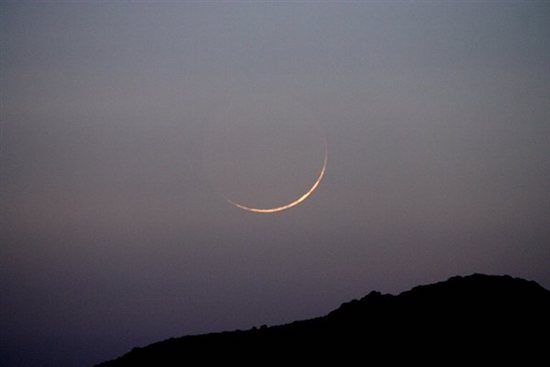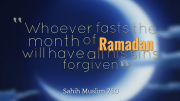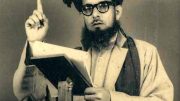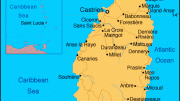Have squared the year to human Compass, Eh?
If so, by striking from the calendar
Unborn tomorrow and dead Yesterday.
(Omar Khayyam, The Rubaiyat)
It’s been over three decades since Muslim leaders in North America have been dithering over the hilal, the new moon crescent that heralds the beginning and end of the Islamic lunar months. For the ordinary Muslim the dispute is a maze. They instinctively know that intentionally missing a fast of Ramadan is a sin that requires expiation and are perplexed why some very senior international scholars have adopted a cavalier attitude when many celebrate Eid on a day a significant number of others are still fasting.
For example, this year some national organizations have encouraged ordinary plebs “to celebrate Eid with their local community, following the dates and moon sighting methodology of their qualified leadership.” I am not entirely clear what “dates,” “moon sighting methodology” and “qualified leadership” means, but the jest of it is that the average mosquegoer should not haggle over the hilal. ‘Leave it to scholars,’ they’re told, scholars who seem blissfully oblivious to the implications of their decisions.
For those who haven’t been following the squabble it’s not that difficult to map. On one side of the ring is a group made up mostly of high-ranking members of the North American cell of the Muslim Brotherhood and the Jamaat-i-Islam. They call themselves the Fiqh Council of North America (FCNA).
The wise men of the FCNA contend that the intent or objective (maqasid) of the Prophetic practice (Sunnah) of ‘sighting’ the hilal was to ascertain the beginning and end of the lunar months. In other words, sighting, i.e. going out and physically looking for the hilal, was the optimal means at his and his community’s disposal. With the immense scientific knowledge and instruments now available, they say, astronomical calculations is a much more accurate methodology to achieve the same objective. In other words, access to astronomical calculations by an elite group of scientists, has rendered the age-old publicly accessible method of sighting obsolete. If you celebrated Eid on Tuesday Aug. 30, you’ve earned your membership in club FCNA. Welcome.
This year FCNA declared Eid before the beginning of the sacred month. Many wondered how these pious scholars could make a declaration when science itself indicated that sighting on Monday evening Aug. 29 was virtually impossible anywhere in the world except in a few isolated pockets. The simple answer is that sighting has been replaced by astronomical calculation. Why? Whittle it down to “convenience and ease,” as Shaykh Yusuf Qardawi outlined in his essay translated by Yusuf DeLorenzo (“Sighting the Crescent For the Purpose of Ascertaining the Month” taken from Kayfa Nata’amal ma’a al Sunnah).
In this same essay, written by the godfather himself of the Muslim Brotherhood, Shaykh Qardawi rubber stamps FCNA’s position. In one of the more outlandish section of his essay, the elderly Shaykh endorses the arguments of one Shaykh Ahmad Shakir as outlined in his article Awa’il al-Shuhur al ‘Arabiyah. Citing the following authentic hadith: “We are an unlettered people. We neither write nor calculate. The month is this way and that …that is, sometimes 29 days and sometimes 30.” (Sahih, Kitab al-Sawm), Shakir and Shaykh Qardawi concludes: A. we are no longer an unlettered community, and B. those who wrote and calculated in the time of the Prophet were the People of the Book (Christians and Jews) who could have used their knowledge to mislead the community of believers. In other words, the Prophet wanted his community to have an independent criteria.
The blunt fact is that the vast majority of Muslims today are even more unlettered than the desert Arabs when it comes to the complex science of astronomy. Secondly, given the blatant error that ‘sometimes’ emerges from calculations one wonders who is ultimately responsible for misleading the community of worshippers? Do we blame this too on a “Jewish Conspiracy?”
On the other side of the ring are local and some national Hilal organizations and committees with no real leadership structure. Let’s call them ‘the sighters.’ Engaging their almost tribal Deobandi-Tablighi network they seek to verify that the hilal is sighted somewhere in North or South America and by a good number of people to reach the level of certainty.
Contrary to rumors of being unscientific and backward looking, the majority of sighters embrace science to determine when and where the hilal could be seen and then set out to verify that it is physically sighted in the regions with the strongest possible visibilities. That to them is the best of both worlds – Sunnah and Science at the service of the worshipper.
If you completed 30 days of Ramadan and celebrated Eid on Wednesday Aug. 31, you believe sighting is a vital Sunnah (many authentic hadith in Bukhari and Muslim attest to this) to mark your place in sacred time. Sacred time is extremely important to you and should never be compromised because it’s minutes and hours hold immense rewards for good actions, charity, sacrifices, and the Divine acceptance of prayers and supplications. Furthermore, you also believe that while astronomical calculations can certainly steer the faithful to the correct horizon on the right day and time, it alone is not sufficient to lift the Prophetic practice (Sunnah) of sighting.
On Monday Aug. 29, Muslims living in the east and in the western hemisphere went out at sunset with the hope of sighting the hilal of the moon. Maged Abou Zahra, president of the Jeddah Astronomical Society, knew the moon could not be sighted in Saudi Arabia at sunset. Still Saudi Arabia declared an end to Ramadan. Many countries with majority and minority Muslim communities followed their lead. But Abou Zahra had a rational explanation for the mistaken sighting. “Saturn, he said, “is visible this time of the year, and can be easily observed with the naked eye.” This has led to headlines in local Saudi newspapers such as “Today is the second of Shawal and third of Saturn.”
That Saudi Arabia would declare Eid on the basis of a false sighting comes as no great surprise regardless of the quantity of ‘husn-al-zann’ they might have accumulated. According to Mohammad Ilyas of Malaysia, one of the leading scholars on the topic of moon sighting, Saudi Arabia claimed to have sighted the hilal 14 out of 36 times, when it was scientifically impossible for it to do so. He wrote that in his book published in 1993. The count is calculably much higher today. On the bright side, Saudi Arabia saw a crescent in the night sky and mistook it for the hilal. The irony is that Saudi Arabia does not determine its calendar on the basis of sighting. Sighting is an attempt to appease Wahabis and Salafis who might launch an intifada if they found out their Kingdom is not so literal when it comes to applying a Sunnah.
Some Salafist communities in North America neither obey FCNA nor adhere to the decision of their local Hilal Committee, but say they’re following ‘global sighting.’ These communities will also never accept a Chinese determination or even a South African. That’s because there is no way they can verify claims of sighting in geographic regions they’re unfamiliar with. Thus, claims of ‘global sighting’ is a ruse to follow the declaration of Saudi Arabia which is home to Islam’s two most sacred mosques. Following the people of Mecca and Madina has its merits and is usually reserved for those with no local alternatives, but since it is done under the guise of ‘global sighting’ this group remains in the camp of the sighters even if uncommitted to its tenets.
In North America, Zulfiqar Ali Shah, executive director of FCNA, looking the part of a perplexed weather forecaster predicting sunshine while drenched in rain, aired a bizarre video message on his company’s website before the end of Ramadan. It’s ‘bizarre’ because FCNA had already declared Eid on Tues. Aug. 30. Was the message an attempt to sell calculation to a community committed to sighting? Or was it an attempt to placate a potential backlash by many against FCNA’s callous disregard of a confirmed Sunnah?
Ali Shah said “there is a strong possibility the hilal will not be seen in the east,” (i.e. Saudi Arabia) however, he said, “it will be sighted in the western hemisphere.” Never did he say “Inshaa Allah.” He explained the basis of his ‘absolute’ claim by calling attention to science, i.e. the age of the moon at the time of sunset in California, Hawaii and South America. If one were to listen to his five minutes heavily edited sermon it is clear the man has a hard time stringing together a few coherent sentences in English. He also has some difficulty distinguishing between ‘visible,’ ‘sighting’ and “sightable.”
Ali Shah quotes the famous hadith of God’s Messenger, peace and blessings be upon him: “Sight it (hilal) and begin fasting, sight it and end your fast.” He omits the second part of the hadith: “But if you are obstructed (i.e. clouded over), then estimate it.” Another version says: “But if you are obstructed, then complete the period of Sha’ban as thirty.”
It is now a fact, call it scientific if you wish, that the new crescent was not sighted anywhere in North or South America. It was impossible to see it. It was not visible. It was not sighted, and if it was sightable, no one saw it.
The claim that the hilal was apparently seen on a beach in south Chile by one Fuad Musa, an unnamed sister and an unnamed Sheikh, was discounted as credible since it was among other things, an isolated observation that did not satisfy the criteria of certainty to end the divinely ordained fast of Ramadan. Last I heard, the majority of the estimated 4,000 Muslims in Chile celebrated Eid on Wed. Aug. 31, completing the 30 days of Ramadan.
It is fair to conclude that Ali Shah was being deceptive, i.e. lying, or he was wholly speculative (i.e. unscientific) when he claimed “it (hilal) will be sighted on Mon. Aug. 29.” One would expect some kind of statement from Ali Shah on behalf of Club FCNA correcting his blatant error. I am not heavy with anticipation.
The ‘sighters’ are not blame free either. My own local Hilal Committee in Toronto operates as if it is deciding a matter in Lahore or a densely populated Muslim city of Gujarat, India, not for the approximately half a million Muslims living in the Greater Toronto Area. For this reason, the formidable West Indian mosques in Toronto have mostly dropped the Hilal Committee and are opting instead for team FCNA. It’s akin to giving up a friendly next door neighbour for a stranger living 100 miles away.
Toronto’s Hilal Committee needs a facelift and the first step is to get rid of the deadbeat Deobandi/Tablighi Jamaat Mullahs and Muftis who much prefer the lazy comfort of their male centric mosques to a forum that is transparent and inclusive.
The two camps are now firmly entrenched in their respective positions. There is a chance that hell will freeze over before the Deobandis abandon what they believe to be a confirmed Sunnah. Club FCNA too is not likely to back away from their now skewed modernist interpretations of the ahadith.
Now that the deck has been sorted and the camps entrenched, the obvious question is what should the ordinary Muslim do after fasting an entire month and only desires peace of mind, a plate of biryani and some well deserved kebabs?
The Internet scholars on Facebook and Twitter are admonishing them to go with the flow and follow their local mosque. In my area alone there are eight different mosque and musallas. Their advise is not helpful. Some are advising patience and allow time for the scholars to debate the issue. That’s been going on for three decades and counting.
Muslims have an enviable and a unique place on the landscape of timekeeping. We are the only community anywhere in the world that still follows a purely lunar calendar. The current crisis is perhaps the first glimpse of its unraveling or an affirmation that sacred time is vital to ensure that all human endeavors confirm to the Divine order.
Hard-working men and women need to make some noise now and if that doesn’t help resolve this issue then people need to make an intelligent and informed decision when it comes to observing the Islamic lunar calendar. At the end of the day, they should take comfort in the fact that the fast of Ramadan is a fard while the Eid prayer and its accompanying celebrations are commendable and beautiful Sunnahs. (Note: I am aware the Eid prayer is Wajib among the Hanafis).





Be the first to comment on "Haggling over the Hilal"